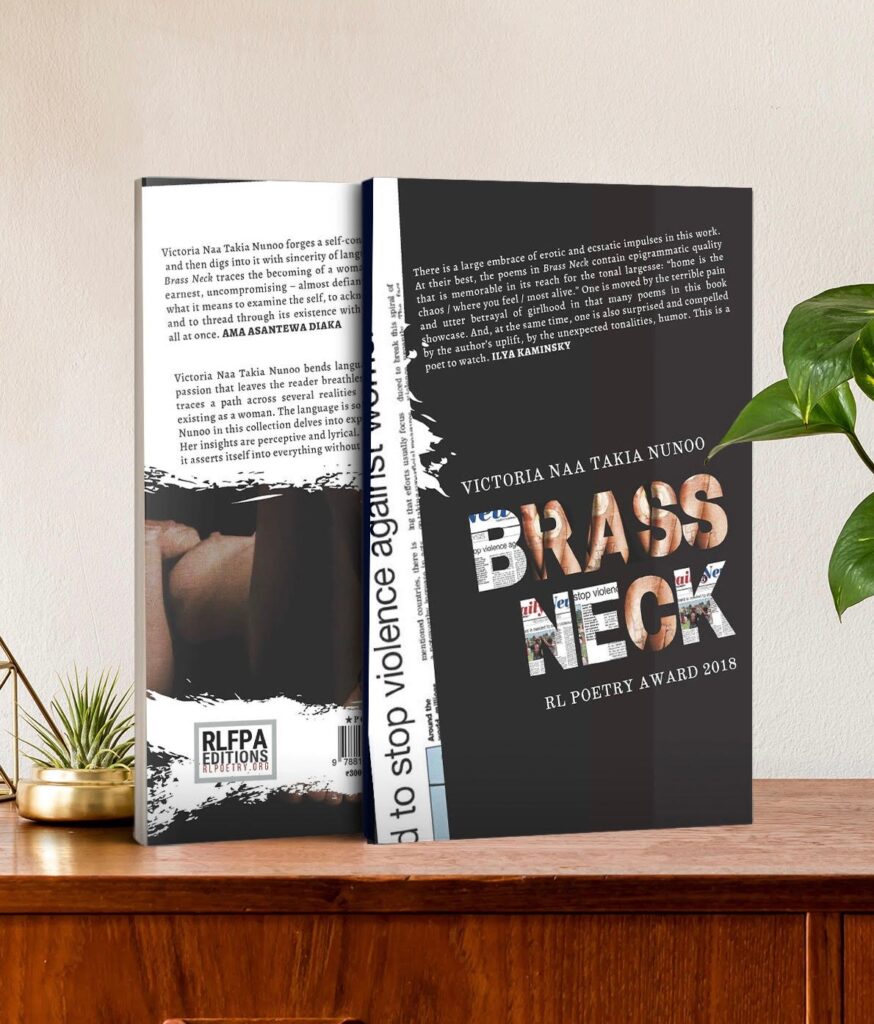Brass Neck – debut book of poems
“Victoria Naa Takia Nunoo forges a self-conscious sense of otherness, and then digs into it with a sincerity of language that draws the reader in. Brass Neck traces the becoming of a woman – probing experiences with an earnest, uncompromising – almost defiant tongue. These poems make bare what it means to examine the self, to acknowledge the self’s own queerness, and to thread through its existence with deftness, precision and empathy all at once.”
“Victoria Naa Takia Nunoo bends language with elegance and a kind of passion that leaves the reader breathless. Brass Neck is a collection that traces a path across several realities especially about the traumas of existing as a woman. The language is soft and intense. Naa Takia in this collection delves into experiences with luminous intensity. Her insights are perceptive and lyrical. The courage of this book is in how it asserts itself into everything without care.”

“Victoria Naa Takia Nunoo forges a self-conscious sense of otherness, and then digs into it with a sincerity of language that draws the reader in. Brass Neck traces the becoming of a woman – probing experiences with an earnest, uncompromising – almost defiant tongue. These poems make bare what it means to examine the self, to acknowledge the self’s own queerness, and to thread through its existence with deftness, precision and empathy all at once.”
“Victoria Naa Takia Nunoo bends language with elegance and a kind of passion that leaves the reader breathless. Brass Neck is a collection that traces a path across several realities especially about the traumas of existing as a woman. The language is soft and intense. Naa Takia in this collection delves into experiences with luminous intensity. Her insights are perceptive and lyrical. The courage of this book is in how it asserts itself into everything without care.”
“Reading Brass Neck, one thinks of Whitman’s passion for the body and insistence that one’s on the connection of all of our bodies, our voices, our pain and pleasure. Of course, Whitman wasn’t the first to give us the poetics of the body. The poems of this book make one think of Sappho and Catullus as much as they do of Whitman. And, yet, it is Walt’s “barbaric yawp on the rooftops of the world” that echoes so much into our own era. One thinks of Orhan Veli of Turkey and Anna Swir of Poland, Israel’s Yona Wollach and many others who have responded to his call. The author of Brass Neck responds as well. There is a large embrace of erotic and ecstatic impulses in this work. At their best, the poems in Brass Neck contain epigrammatic quality that is memorable in its reach for the tonal largesse: “home is the chaos / where you feel / most alive.” One is moved by the terrible pain and utter betrayal of girlhood in that many poems in this book showcase. And, at the same time, one is also surprised and compelled by the author’s uplift, by the unexpected tonalities, humor. This is a poet to watch. “